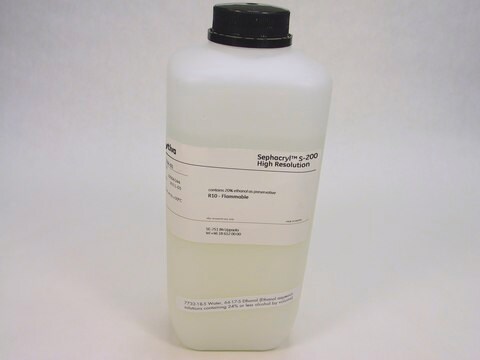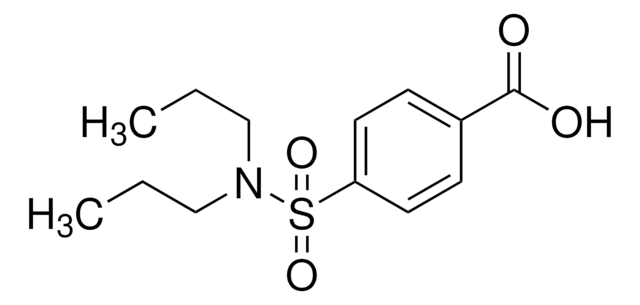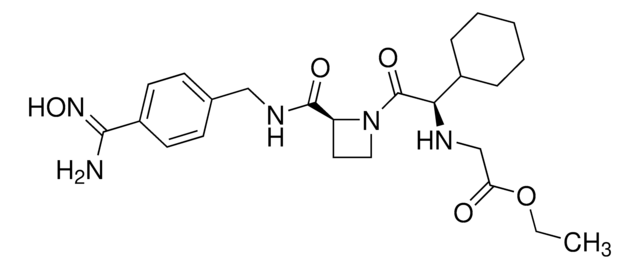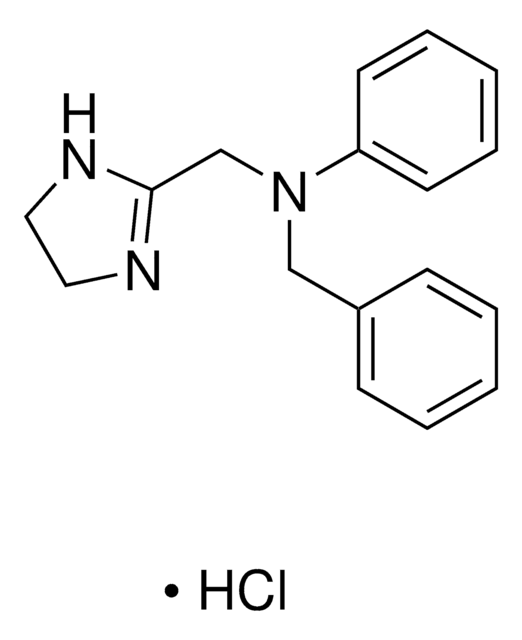SML0846
Anagrelide hydrochloride
≥98% (HPLC)
Sinonimo/i:
6,7-Dichloro-1,5-dihydro-imidazo[2,1-b]quinazolin-2(3H)-one hydrochloride
About This Item
Prodotti consigliati
Livello qualitativo
Saggio
≥98% (HPLC)
Forma fisica
powder
Condizioni di stoccaggio
desiccated
Colore
white to beige
Solubilità
DMSO: 1 mg/mL, clear (warmed)
Temperatura di conservazione
2-8°C
InChI
1S/C10H7Cl2N3O.ClH/c11-6-1-2-7-5(9(6)12)3-15-4-8(16)14-10(15)13-7;/h1-2H,3-4H2,(H,13,14,16);1H
TVWRQCIPWUCNMI-UHFFFAOYSA-N
Descrizione generale
Fab fragments from polyclonal anti-fluorescein antibodies, conjugated to alkaline phosphatase.
After immunization with fluorescein, the sheep IgG was purified by ion exchange chromatography and the specific IgG was isolated by immunosorption. The Fab fragments obtained by papain digestion were purified by gel filtration, conjugated with alkaline phosphatase, and stabilized in 50 mM triethanolamine buffer, 3 M NaCl, 1 mM MgCl2, 0.1 mM ZnCl2, 1% bovine serum albumin (w/v), pH 7.6.
Clone: polyclonal
Ig class: sheep IgG, Fab fragments
Azioni biochim/fisiol
Caratteristiche e vantaggi
Avvertenze
Warning
Indicazioni di pericolo
Consigli di prudenza
Classi di pericolo
Aquatic Chronic 4 - Carc. 2 - Repr. 2
Codice della classe di stoccaggio
11 - Combustible Solids
Classe di pericolosità dell'acqua (WGK)
WGK 3
Punto d’infiammabilità (°F)
Not applicable
Punto d’infiammabilità (°C)
Not applicable
Certificati d'analisi (COA)
Cerca il Certificati d'analisi (COA) digitando il numero di lotto/batch corrispondente. I numeri di lotto o di batch sono stampati sull'etichetta dei prodotti dopo la parola ‘Lotto’ o ‘Batch’.
Possiedi già questo prodotto?
I documenti relativi ai prodotti acquistati recentemente sono disponibili nell’Archivio dei documenti.
Articoli
Cyclic nucleotide phosphodiesterases (PDEs) catalyze the hydrolysis of cAMP and/or cGMP. There are 11 different mammalian PDE families.
Contenuto correlato
Cyclic nucleotides, including cyclic AMP (cAMP), cyclic GMP (cGMP) and cyclic ADP-ribose, have been extensively studied as second messengers of intracellular events initiated by activation of GPCRs. cAMP modifies cell function in all eukaryotic cells, principally through the activation of cAMP-dependent protein kinase (PKA), but also through cAMP-gated ion channels and guanine nucleotide exchange factors directly activated by cAMP.
Il team dei nostri ricercatori vanta grande esperienza in tutte le aree della ricerca quali Life Science, scienza dei materiali, sintesi chimica, cromatografia, discipline analitiche, ecc..
Contatta l'Assistenza Tecnica.








